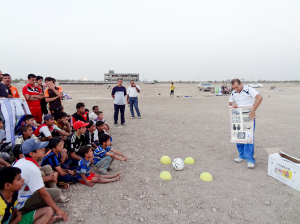
According to the United Nations, landmines kill an average of 15,000 to 20,000 people a year, and it is reported that 70-85% of these casualties are civilians–most of them being children. U.S. civilian agencies have been working for years to decrease the number of casualties from these weapons. Through this work, nearly 15 countries have become mine-impact free, and countless lives are being saved. One way the State Department is being effective is by utilizing private sector partners in their efforts to educate on the danger of landmines and explosive remnants of war.
 Spirit of Soccer has been working since 1996 to employ a curriculum of MRE coupled with soccer games and drills as an engagement tool. More importantly, the Pennsylvania-based group is partnering with the State Department to employ this effective learning tool in many places in the developing world. According to the Spirit of Soccer, the focus on children is due to the fact that they are “especially vulnerable to the dangers of ERW. Naturally curious, children are most likely to pick up strange or shiny objects thinking they are toys, or to try to salvage them for scrap metal.” The organization, which was started by former British soccer coach and Scott Lee, has helped over 167,000 children in places like Bosnia, Cambodia, Iraq, Kosovo, Laos, and Moldova.
Spirit of Soccer has been working since 1996 to employ a curriculum of MRE coupled with soccer games and drills as an engagement tool. More importantly, the Pennsylvania-based group is partnering with the State Department to employ this effective learning tool in many places in the developing world. According to the Spirit of Soccer, the focus on children is due to the fact that they are “especially vulnerable to the dangers of ERW. Naturally curious, children are most likely to pick up strange or shiny objects thinking they are toys, or to try to salvage them for scrap metal.” The organization, which was started by former British soccer coach and Scott Lee, has helped over 167,000 children in places like Bosnia, Cambodia, Iraq, Kosovo, Laos, and Moldova.
This is not the first time the State Department has utilized the healing power of sports to have a positive impact in the developing world. As part of the Sports Diplomacy initiative, children across the developing world are using sports as an avenue for a better life.
But given the crisis in Syria, Spirit of Soccer is partnering with the State Department through a $50,000 grant to provide a curriculum of soccer clinics and MRE to children in the Za’atri refugee camp. The Za’atri camp includes over 120,000 Syrian refugees, half of whom are children under age 17. Using soccer as an engagement, Spirit of Soccer is reaching Syrian children in the refugee camps to teach them about soccer, while also preparing them for spotting landmines when they return to their homes after the conflict.
It’s these partnerships that embrace the power of sportsmanship, but also the power of American values to improve the humanitarian situation for many.